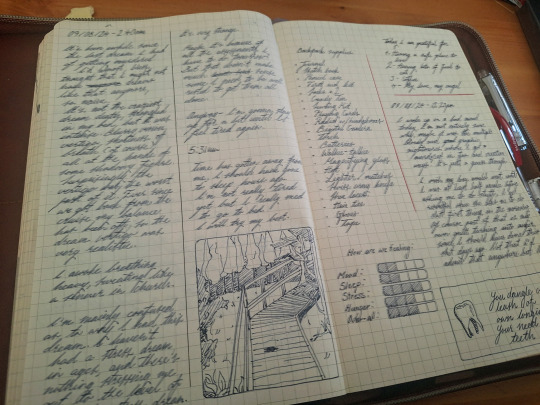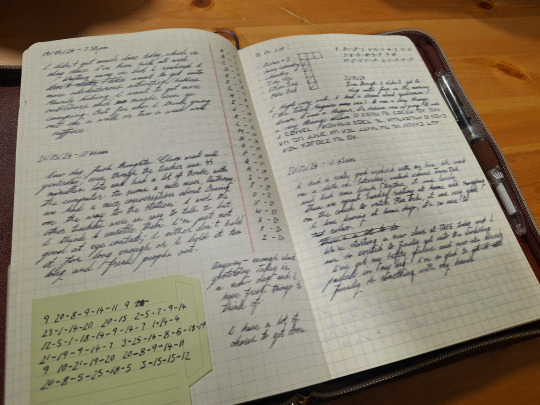charlemagne / 28 / studyblr + langblr / japanese, spanish and mandarin
Don't wanna be here? Send us removal request.
Text
shoutout to slow growers, late bloomers, people whose plans got derailed by circumstances beyond their control or their own choices, people who never had a plan to begin with, people who have had to start over when theyre too old to feel like theyre supposed to be where they are, people who cant pretend theyre built for the environment theyre in, and everyone who's not living the life they thought they would. im proud of you for making it this far and i hope you keep going until youre happy ♡
66K notes
·
View notes
Text


Accounting and excel studies + some reading ~ June 2nd
My goal this week is to finish the last two modules of the accounting course. Afterwards, it’s just a matter of doing the practice problems and reviewing. I plan on taking a financing modeling course in July, so I need to improve my excel skills asap (boooo 🤧).
📖 Currently reading: Junie by Erin Crosby
I’ve been enjoying this a lot. I’m only 68 pages in, so it’s too soon to recommend, but I feel it’s a good book. There's a repetitive trope I'm hoping the author doesn't fall into, so fingers crossed.
14 notes
·
View notes
Text




1K notes
·
View notes
Note
Es divertido a mí que algunas palabras de español se ven como palabras de inglés pero se referen a alguno muy diferente, por ejemplo ‘embarazada’ y ‘embarrassed’ - un par comunísimo, yo sé. ¿Qué son unas palabras tramposos (para hablantes de inglés) que sabes?
Some very common false cognates or partial false cognates:
sensible = sensitive [the word sensible is related to sentir "to feel", so sensible is someone who feels a lot aka "sensitive"; in English "sensible" as in "having sense" is sensato/a]
la sopa = soup [for us we see la sopa and we would be inclined to think "soap" but that is el jabón]
actual = "current", "updated" [normally "actual" for English speakers is real or concreto/a, but in Spanish actualmente is "currently" or "happening now"... when we usually would want "actually" which is de verdad]
la complexión = physique [this refers to your physical build in Spanish; the word we associate it with is la tez which is "the complexion of someone's skin" or sometimes they talk about el tipo de (la) piel "skin" or "skin type"]
la carpeta = folder [a "carpet" is la alfombra]
la ropa = clothes [a "rope" is usually la soga "rope"]
pariente = relative [this is one of your relatives in a family; but los padres is "parents"]
realizar = to finalize, to carry out [lit. "to make a reality"; the "realize"; what we usually want to use is darse cuenta "to have a realization"]
agonizar = to be dying, to be in the process of imminently dying, "to be in your death throes" [instead of "agonizing" like over a decision which I normally see as dar vueltas "to go back and forth" or atormentarse "to be tormented"]
largo/a = long [we think "large" which is grande or enorme for "big" - largo/a means "long"]
asistir = to attend [sometimes "to assist", but also is the verb you'd use like "to attend/go to school" is asistir a la escuela]
la asignatura = assignment [we see this and would assume "signature", but that's la firma - asignar is "to assign" or "to give an assignment"]
la firma = signature [we would see this and think "firm" like a "law firm" - that is typically el bufete]
gracioso/a = funny [while la gracia can be "grace" it can also mean "something funny" or "humor"... thus gracioso/a can sometimes be "gracious" or "graceful" but it almost always means "funny" - the word "gracious" is usually cortés which is "polite" but the more common word is educado/a "educated/having manners"... or it could simply be amable "kind/loving"; and "graceful" is usually elegante "elegant", or sutil or grácil which is "graceful" and "subtle/gentle"]
envolver = to envelope, to wrap, to be encompassed [usually we're looking for "to involve" which is involucrar or tener que ver con (algo) "to have to do with"]
la copa = glass of wine, "a drink" / wine glass [la copa is more related to the word "goblet", and it can refer to "cup" for sports but in Spanish drinkware is usually divided into three terms: el vaso is a "glass of water" or a "vase", la taza is usually "cup of tea" or "cup of coffee", and la copa implies alcohol often "a glass of wine" or "a cocktail", and ir de copas is "to go out drinking"]
el disgusto = annoyance [usually el disgusto is a sign of displeasure, annoyance, or contempt - we see "disgust" which is usually el asco which implies revulsion or possibly nausea where dar asco is "to be gross, to be disgusting"]
soportar = to tolerate, to put up with, to bear [soportar is sometimes confused with "to support", which is often apoyar as in "to help someone" or in some cases "to support" as in "to keep up" is mantener..... soportar means "to tolerate", and insoportable is "unbearable"]
alterar = to upset [alterar can be "to alter", though it's often cambiar; usually alterar or alterado/a refers to "upset" or "unhappy", where if someone is alterado/a it means they're angry or bothered by something]
molestar = to annoy [this one is really hard for English-speakers who are new - molestar does not carry any sexual connotation in Spanish, it's simply "to annoy" or "to bother"; the word for "to molest" which does have sexual connotations is usually abusar "to abuse" or acosar which is "to stalk" or "to bully" and it's often narrowed down with the proper adjective - el acoso sexual is "sexual harassment" literally, implying that it's a kind of bullying or degradation that is sexual in nature]
introducir = to insert [this does mean "introduce" in the sense of "to put into something else".... but the word for "to introduce oneself" is presentarse]
el compromiso = commitment [el compromiso or comprometer refers to a kind of "commitment" one has made; and comprometer is another word for "engaged (to be married)" - in general it isn't "compromise" in the sense of an agreement, which is usually el acuerdo]
la lectura = reading [la lectura is related to leer "to read"; a "lecture" in school might be la conferencia or simply la lección "lesson" or la clase; but if someone is giving you a "lecture", that's usually el sermón like a sermon and sermonear is "to give a lecture" or "to give a sermon"; either in the religious sense, or the lecturing sense where people can sarcastically say you're giving a sermon like a priest]
sano/a = healthy [sano/a usually means "healthy" of body; the word for "sane" like "not crazy" is cuerdo/a]
la sanidad = health service, good health, safety [same as above, la sanidad can be another term for la salud though it usually refers to health services like "sanitation" or the state of being in good health; la Sanidad is also the general term for "the Department of Health" or "the Ministry of Health"... it's kind of like the upkeep required to be healthy/safe]
el suceso = event, occurrence [this is related to suceder "to happen/occur"]
el éxito = success [this is ACTUALLY "success", unlike suceder...... unfortunately people see el éxito and think "exit" which is la salida from salir]
bombero/a = firefighter [this one makes more sense if you know the root etymology - la bomba does mean "bomb", but also means "pump", and so los bomberos are "firefighters" or "people who work the (water) pump"; the word for "bomber" is bombardero/a which is closer to "bombardier" in French]
la red = net, network [this is a literal "net" but la red has come to be used with the internet and any kind of "network" - las redes sociales for example is "social media", or literally "social networks"; thankfully you probably already know that rojo/a is "red" the color]
colorado/a = red, ruddy [the word for "colored/colorful" is usually colorido/a with an I, or con/en colores... but colorado/a is another term for red, as colorete is another word for "blush" as in the makeup; colorado/a makes sense in the sense of "having color in one's face". Americans will find this easier to understand by the state Colorado and the Colorado River... which was named that way because it's red; colorado/a is quite often used to describe facial color, which is where you get "ruddy" as in "reddish complexion"]
bizarro/a = brave, gallant [this is a bit of an odd etymology because some will claim it's Basque some will claim it's Italian; the original word bizarro/a is related to anger and specifically soldiers so it's like people that will charge into battle - the French term bizarre is where English takes it for "strange/weird"; in Spanish that's extraño/a or raro/a - though note that some places DO use bizarro/a as "strange"; another possible interpretation is that it's someone who's "outlandish" like big personality, brave, kind of more on the reckless side, so it can come out as "gallant" or "grandiose" in some contexts]
culto/a = educated, learned, someone who is well-read or well-educated [culto/a here means "having formalized education" or someone with lots of intelligence... the word el culto "cult" does exist but it's not always the one you want since it can refer to a devotional order (not specifically dangerous or scary) - the word "cult" in Spanish is usually la secta and "cultists" are sectario/a]
demandar = to sue, to bring a lawsuit against someone [la demanda also is "a lawsuit", not a demand; usually the verb for "to demand" is exigir - there are times when la demanda can be a demand but in the sense of "the situation demands" or "these are my demands"... la exigencia is more common as the "strongly worded forceful need" kind of feeling]
la ganga = bargain, deal [In English we would probably think it meant "gang" like a criminal gang which is usually la banda or la pandilla - they do use el gángster in Spanish though; other words you might see is el hampa "criminal organization", or los bajos fondos which means "the criminal underground" but is literally "the deep depths"]
la librería = bookstore [this one is hard because some people do use it as "library", but the general word for library is la biblioteca. The suffix -ría usually implies a place where something is sold like "pizzeria" in English; in Spanish you would probably see la panadería "bakery" or "where bread is sold", la pastelería "bakery (for cake)" where "pastry is sold", or something like la herrería which is now like "hardware store" a place where "iron/smithing tools are sold" - this one is understandable though, biblioteca is Greek "place where books are kept", but librería comes from Latin "place where books are sold"]
There are also a few very partial cognates, or words that kind of mean different things than what you'd expect in some cases.
Like abandonar is "to abandon", but it can be "to leave a place" so it isn't always "leaving someone behind", it can be just "leaving"
There's also real which has two meanings; "real" [de verdad is another term], but also means "royal" - like el pavo real is "peacock" but "royal turkey" literally; and if you ever see la Real Academia you'll know it's Royal Academy, not Real Academy
el tinto does mean "tint", but it has two separate meanings; first el vino tinto is the term for "red wine", so in some cases you'll see it means "red" or "dark liquid" - the term is usually more "burgundy" so think very deep red... and the second meaning is that for some countries, el tinto refers to "black coffee".... Somewhat related, but la tinta is "ink"
For Christians, you'll see la cura is "cure", but masculine - el cura is "priest"; a general term for priest is also el sacerdote (or la sacerdotisa "priestess" if female) but that's not confused with anything; also la curita is "bandage" like "bandaid"... UK would call this a "plaster"
Another is asesino/a which is "murderer" - not specifically "assassin" which is sometimes described as asesino/a profesional; you can use asesino/a for both, and the verb asesinar is "to murder" or "to assassinate" but English has a kind of distinction between "murder" and "assassinate"
A good one to know is la quimera which you'd know as "chimera" like a fused monster from Greek mythology, or just science/biology or sci-fi things... it can also be "an unrealistic fantasy" or "a pipe dream", like a dream/goal that is unattainable or unrealistic, "pie in the sky" sort of things
A really common one is raro/a which can be "rare", but also means "strange" - both connected to the idea of "uncommon" but English has more of a disconnect between the words
ignorar is another one; it most often means "to ignore", but it can also be "to not know" or "to be ignorant of" - not always a conscious decision, but a state of not knowing something
preciso/a is one that throws me off a lot - it can be "precise", but it's usually more "necessary" or "critical"; as precisar is a synonym of necesitar
guardar can sometimes be "to guard", but it is often "to keep" or "to hold onto"; usually "to guard" is defender or proteger as "defend" and "protect"
Then there's la arena which can be "arena" like a "stadium", but also means "sand"
-
Another one that will trip you up all the time especially if you read a lot of regency things or fantasy or romantasy... is pretender. First, pretender is a verb, and it's not "pretend" the way you're thinking... pretender is "to claim" or "to attempt"; it refers to "to make a claim for something" [literally "before" + "have/grasp"]
pretender is used like "to claim the throne", so a "pretender to the throne" is not specifically a "liar", it means someone who wants to take the throne - that verb pretender goes to the noun pretendiente "claimant" or "someone making a claim"
The OTHER important way it's used is that it is "to woo"; just as you can "claim a throne", you can try to "claim someone's hand" and that's what that means
If you read the Odyssey for example, Odysseus kills the many "suitors" who have camped out in his home while he was away, trying to marry his wife Penelope. The word "suitor" in Spanish is pretendiente... so if you look in art you might see something like Odiseo matando a los pretendientes "Odysseus killing the suitors" or La matanza de los pretendientes "the killing of the suitors"
The verb for "to pretend" in English is fingir [like "feign"] or mentir "to lie"; and the words for "pretender" in that case are mentiroso/a "liar", or it's farsante which is related to "farce", so someone who carries out a farce or is a general liar
...
The most important one I can think of is emocionante which is "exciting", and excitante which is "arousing"
First, la emoción has two meanings - "emotion" as in feelings, and then "excitement" like happy anticipation; and so emotivo/a or sensible mean "emotional" as in having lots of feelings... then emocionante means "exciting" as in causing happy anticipation
Second, excitar is "to arouse", usually in the sexual way, so excitante is often more sexual - it isn't always this way but this is a common one people tell you to avoid because it comes out as "horny" in some cases
#queueriouser and curiouser#langblr#spanish langblr#learning spanish#spanish language#spanish vocabulary
95 notes
·
View notes
Text


planning & studying
764 notes
·
View notes
Text

12.05.24 let's hope my prof likes my idea :)
123 notes
·
View notes
Text


friday | may 23
i think i've got about 30 minutes before the level of caffeine in my system shifts from "happy, energized, and motivated" to "ball of anxiety". taking advantage of my current state to make some more headway on grad school research!
54 notes
·
View notes
Text


20.05.2025/Tuesday
Started the day by studying electrophysiology!🧠📚
395 notes
·
View notes
Text




19.05.25 🍓 ☕ 📚 somehow this semester is not stressful enough to complain about but just stressful enough to feel tired all the time, so i let myself be peer-pressured into drinking coffee for the first time :') bitter af
514 notes
·
View notes
Text

can’t do physics with this little girl distracting me
#queueriouser and curiouser#study motivation#study inspiration#me with my kitty trying to be in my business whenever I get the tarot cards out lol
122 notes
·
View notes
Text

235 notes
·
View notes
Text


Index Cards — Moyra Davey
69 notes
·
View notes
Text
daily affirmations: at least I'm no longer 14
26K notes
·
View notes
Text




I began to keep a journal
1K notes
·
View notes
Text

🇲🇽 Spanish Word Wheel - Las Chelas
Las Chelas - Beer 🍺
• I want to drink a beer.
• Quiero tomarme una chela.
• They went to go buy some beers.
• Fueron a comprar unas chelas.
Explanation: In standard Spanish 🇪🇸 beer is “la cerveza” but in Mexican slang beers are also referred to as “chelas”.
[Gif not mine]
#queueriouser and curiouser#spanish langblr#langblr#learning spanish#spanish language#spanish vocabulary#studyspo
4 notes
·
View notes
Text


black iced americano
296 notes
·
View notes
Text


it's raining and that means a cozy study session.
777 notes
·
View notes